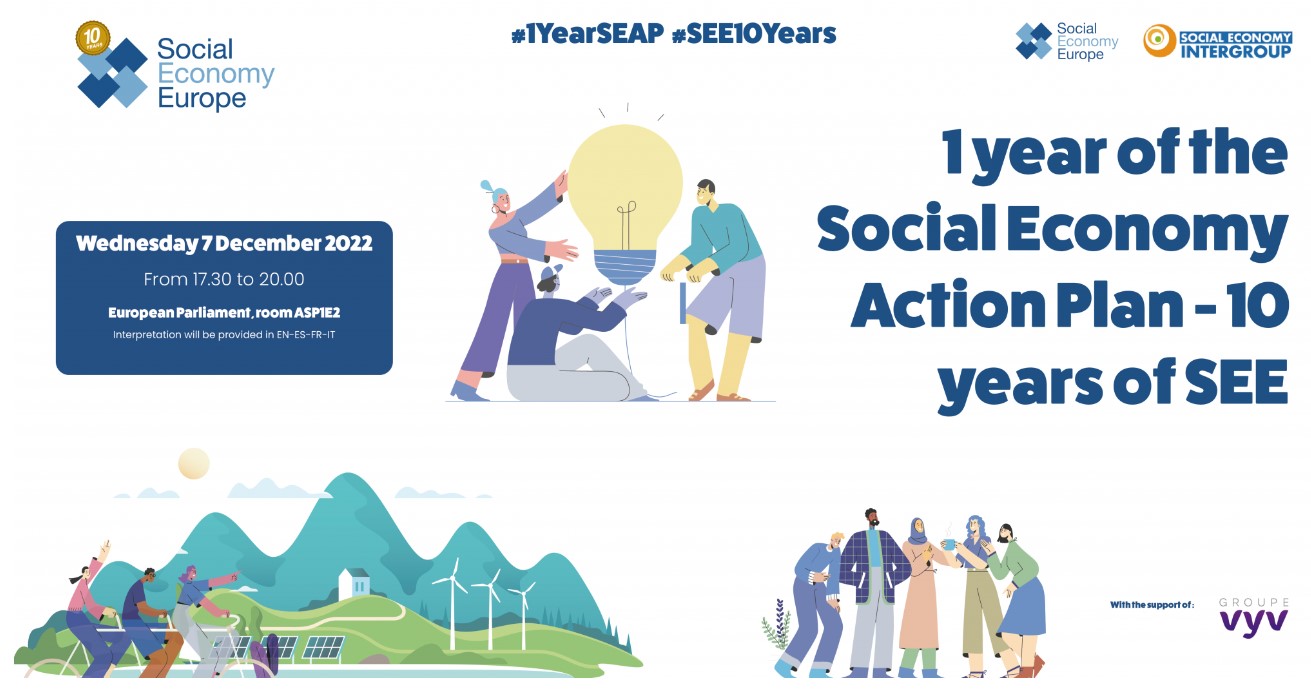Germany rediscovers the social economy – 10 years late 14 December 2022
Posted by cooperatoby in EU, social economy, Social enterprise.Tags: DE, EU, social enterprise
trackback

I should have realised that something was brewing when the European Social Economy Summit culminated in Mannheim in April 2021. We couldn’t actually go there of course as this was during the COVID lockdown.
This time, to mark 10 years of Social Economy Europe and one year of the Social Economy Action Plan on 7 December, I could theoretically have gone in person to the European Parliament. But it was booked out, so I had to be content with a video link. I saw SEE’s birthday cake, but I missed the festive glass of wine.
It was an elevating, exciting couple of hours, jam-packed with inspiration and solid evidence of the social economy’s growth and effectiveness. It’s hard to say which of the causes for celebration is the more significant.
Amid the celebrations and exhortations, the big news for me was that Germany has rediscovered the social economy.
A German SEAP
After serving as a Green MEP since 2009, Sven Giegold was appointed State Secretary at the Federal Ministry for Economic Affairs and Climate Action last December. Now, as Sven’s colleague Katrin Elsemann announced, Germany is finally getting down to writing a social economy strategy too. Based on the European SEAP, it covers policy and legal frameworks, public procurement, access to finding and impact measurement. More practically, it also includes support infrastructure, links between businesses and associations, and women’s entrepreneurship. At European level two important issues are state aid and cross-border work by associations. The action plan is to be launched next Spring, and (just like EQUAL 2 decades ago) will be funded by ESF+. As an earnest of its intent, Germany will sign the Luxembourg Declaration. It remains to involve the education and economics ministries.
It’s a long overdue change in policy. In 2002, Germany stormed into the EQUAL programme with a very well-structured and strategic programme. Like Britain, it focused resources on a small number of large projects, which built partnerships between public authorities, welfare associations and assorted social innovators. Germany set up a thriving National Thematic Group, which by the mid-point of EQUAL in 2005 was on the point of publishing a comprehensive handbook. But for mysterious reasons the plug was pulled. The focus was turned back to the more anodyne idea ‘inclusive entrepreneurship’. Nevertheless at the final event in June 2027 in Hannover, the social economy presented very strong evidence. The social economy went on to become the third most popular theme in EQUAL, with 17 countries prioritising it. And in 2011 the Social Business Initiative took the struggle a step further. Welcome back!
The future of the planet
The whole event was a miracle of timekeeping managed by Chris Gordon of the Irish Social Enterprise Network, who managed with good humour to compress 16 speeches into his allotted span of 2¾ hours.
Noting that it has taken 10 years of hard work to get to this point, Alain Coheur, President of the EESC’s Single Market, Production and Consumption Section, said we had to keep up the pressure: “It’s about the future of the planet! We have a unique historic opportunity. We are not an epiphenomeon, an accident in capitalism. We have to gather the fruit of our work, not be usurped by consultants. We bring hope!”
Letting loose a scoop, he announced a conference in 2024 in Liège. But before then comes one on 17 November 2023 in Donostia-San Sebastián.
As an envoi, SEE’s Victor Meseguer was finally allowed half a minute in the limelight to exhort us to further collective action. Over to us.
Update 20 Oct 23:
Pioneers’ Post interview on Germany’s new national strategy for social innovation and “companies oriented towards the common good”




Comments»
No comments yet — be the first.